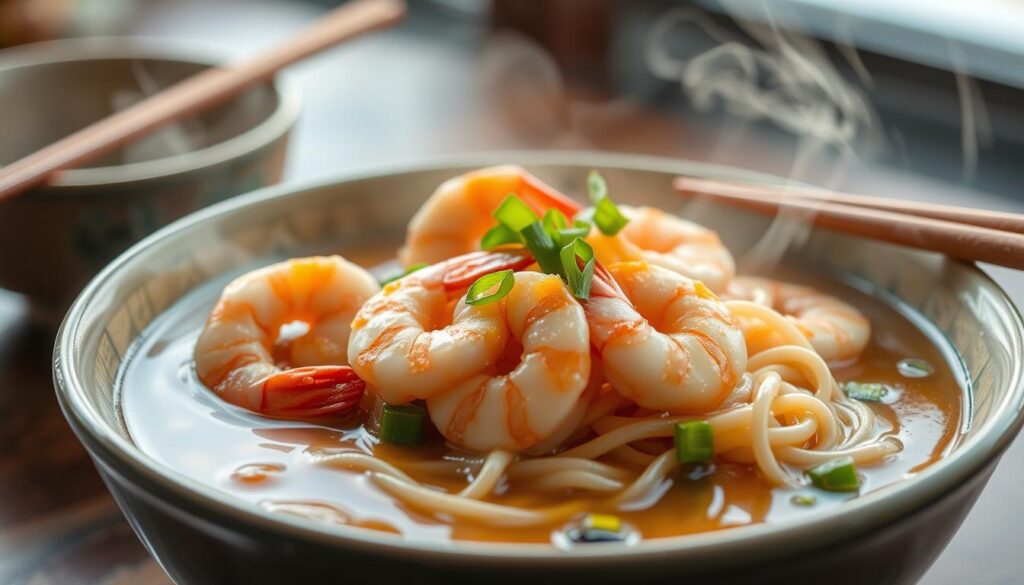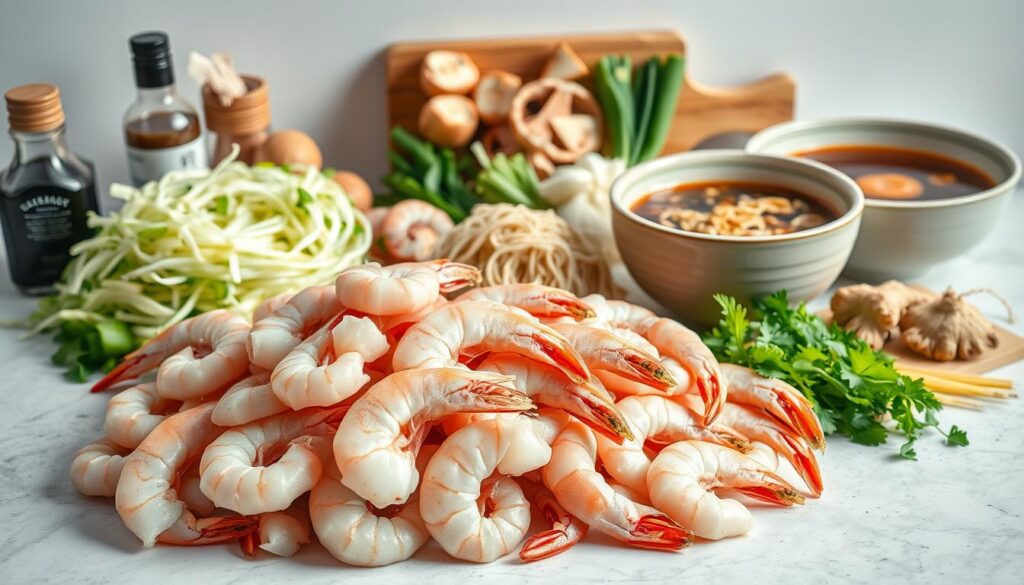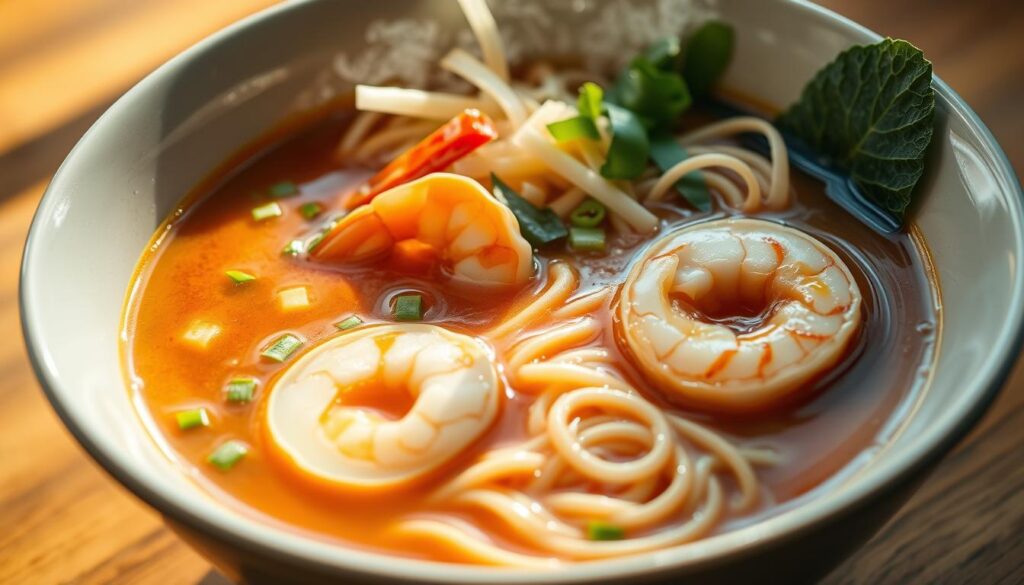Every kitchen has a secret for turning simple ingredients into a special meal. Ramen noodles with shrimp is my go-to for a quick, comforting dinner. It’s a Japanese dish that’s easy to make and always a hit.
Imagine coming home after a long day and wanting something warm and tasty. Ramen Noodles is more than just a meal; it’s a journey of flavors you can take in your kitchen. With just a few ingredients and some quick steps, you can make a dish that tastes like it came from a restaurant.
No need for complicated recipes or hours of cooking. This shrimp ramen is perfect for those who want great taste without the fuss. It’s ideal for anyone who’s busy or just loves good food. It’s your new favorite comfort dish.
Are you ready to see how easy it is to make a delicious bowl of shrimp ramen? It’s a simple way to turn basic ingredients into a meal that will warm your soul and impress your friends.
Understanding the Art of Shrimp Ramen
Dive into the world of seafood ramen, a culinary delight that captures the essence of Asian cuisine. Ramen has evolved from a simple noodle dish to a global sensation. Shrimp is a key ingredient, adding unique umami flavors.

Origins of Seafood Ramen
Seafood ramen comes from Japanese culinary traditions. Brands like Sapporo Ichiban introduced shrimp-flavored ramen. This innovation changed instant noodle offerings, showing ramen’s versatility.
Benefits of Making Ramen at Home
- Customization: Tailor your dish to personal taste preferences
- Cost-Effectiveness: Prepare delicious meals without restaurant prices
- Healthier Choices: Control ingredients and nutritional content
- Skill Development: Enhance your culinary expertise
- Cultural Connection: Explore authentic Japanese cooking techniques
Essential Components of Perfect Shrimp Ramen
| Component | Key Considerations |
|---|---|
| Broth | Rich, well-seasoned base with seafood or miso undertones |
| Noodles | Fresh, firm texture that absorbs flavors perfectly |
| Shrimp | Cooked precisely to maintain tender sweetness |
| Toppings | Fresh vegetables and aromatic garnishes |
Your journey into crafting exceptional seafood ramen starts with understanding these key elements. Each part is vital for a balanced bowl of umami flavors. It celebrates the rich traditions of Asian cuisine.
Essential Ingredients for Authentic Ramen Noodles with Shrimp
Starting an amazing shrimp noodle soup begins with picking the right ingredients. Your journey in the kitchen needs the best parts to make a meal you’ll remember.

To make a true ramen, you need a few key ingredients. They add depth and make your dish special:
- Pacific White Shrimp – The main protein of your soup
- Top-notch ramen noodles
- Fresh lemongrass and garlic for flavor
- Condiments to boost the taste
Your toppings can turn a good dish into an amazing one. Here are the must-haves for extra flavor:
- Fresh scallions
- Soft-boiled egg
- Nori seaweed
- Sesame seeds
“The magic of ramen lies in its carefully balanced ingredients” – Chef Masaharu Morimoto
Choosing the best ingredients is crucial. Fresh, quality parts will make your shrimp noodle soup taste like it’s from a restaurant.
Creating the Perfect Shrimp Broth Base
Making a great shrimp broth is key to making your ramen amazing. It’s all about getting the most umami from fresh shrimp shells. This turns them into a rich, flavorful liquid that’s the heart of your dish.
To make a top-notch shrimp broth, you need to pay close attention and know how to bring out flavors. Your goal is to make a broth that’s full of seafood taste and umami.
Selecting Quality Shrimp Shells
The best shrimp broth starts with the right shells. Choose shells that are:
- Fresh and bright in color
- Without black spots or discoloration
- From recently peeled shrimp
Aromatics and Seasonings
Add to your broth with aromatics that match the seafood’s sweetness. Key items include:
- Ginger
- Garlic
- Lemongrass
- Dried kelp
Simmering Techniques
Getting the right simmer is key to bringing out umami from your shrimp shells. Here’s how to do it:
- Roast shells lightly before simmering
- Use low, steady heat
- Remove any foam that forms
- Strain well to get a clear broth
| Ingredient | Quantity | Purpose |
|---|---|---|
| Shrimp Shells | 2 cups | Primary flavor base |
| Ginger | 2 inches | Aromatic enhancement |
| Garlic | 3 cloves | Depth of flavor |
| Water | 6 cups | Broth volume |
With these tips, you’ll make a shrimp broth that turns your ramen into a top-notch dish. It will be full of rich, deep umami flavors that will excite your taste buds.
Preparing and Cooking Pacific White Shrimp
Choosing the right shrimp is key for tasty ramen noodles with shrimp. Pacific White Shrimp has a sweet flavor that makes your ramen special. Before cooking, prepare your shrimp well to get the best taste and texture.
Here are key steps for preparing Pacific White Shrimp:
- Rinse shrimp thoroughly under cold water
- Pat dry with paper towels to remove excess moisture
- Remove the shell, leaving tail on for presentation
- Devein carefully using a small paring knife
Cooking techniques are important for your shrimp ramen. The right method makes shrimp tender and flavorful. Pro tip: Cook shrimp until they turn pink and curl slightly. This usually takes 3-5 minutes over medium-high heat.
Seasoning is also crucial for enhancing your shrimp. Try a mix of:
- Kosher salt
- Fresh cracked black pepper
- Garlic powder
- A pinch of red pepper flakes
Remember, overcooked shrimp become tough and rubbery – patience is key to achieving that perfect bite in your ramen noodles with shrimp.
By following these steps, you’ll make Pacific White Shrimp a standout protein in your homemade shrimp ramen. It will be a dish to remember.
Mastering the Garlic Butter Shrimp Topping
Make your shrimp noodle soup special with a garlic butter shrimp topping. It turns ramen toppings into something amazing. This easy method adds depth and richness to your dish.
To make perfect garlic butter shrimp, you need to be precise. It’s all about balancing flavors and getting the right texture.
Proper Seasoning Methods
Seasoning your shrimp right is key for a great flavor. Here’s what to do:
- Pat shrimp dry before seasoning to ensure crisp edges
- Use kosher salt and freshly ground black pepper
- Optional: Add a pinch of cayenne for subtle heat
- Sprinkle minced fresh garlic for intense aroma
Cooking Temperature and Timing
When cooking garlic butter shrimp, precision is crucial. Your pan should be hot for a golden sear without burning the shrimp.
- Use medium-high heat
- Cook shrimp for 2-3 minutes per side
- Look for a slight curl and opaque coloration
- Remove immediately to prevent overcooking
Achieving Perfect Texture
The garlic butter shrimp should be tender, juicy, and full of flavor. Don’t overcook, as it makes the shrimp tough and ruins your ramen.
“Cooking shrimp is an art of timing and temperature – master these, and you’ll create a topping that transforms your dish.” – Professional Chef
By using these methods, you’ll make garlic butter shrimp that’s a perfect ramen topping. It adds beauty and flavor to your shrimp noodle soup.
Building Your Bowl: Assembly and Presentation
Creating an authentic ramen restaurant experience starts with masterful bowl assembly. Your shrimp ramen isn’t just a meal—it’s a culinary canvas. It brings Asian cuisine to life through thoughtful layering and presentation.
Follow these key steps to transform your homemade ramen into a restaurant-worthy dish:
- Select a deep, wide bowl that showcases your ingredients
- Gently place cooked ramen noodles as the foundation
- Ladle hot, rich shrimp broth over the noodles
- Arrange cooked shrimp strategically across the surface
- Garnish with fresh elements for visual appeal
The secret to an Instagram-worthy ramen bowl lies in strategic placement. Arrange your garlic butter shrimp slightly off-center, allowing the broth to peek through. Sprinkle finely chopped green onions and add a wedge of lime for brightness.
Professional ramen chefs know that visual presentation is as crucial as flavor. Your bowl should tell a story—inviting, colorful, and meticulously crafted. Each ingredient should complement the others, creating a harmonious dining experience. This celebrates the artistry of Asian cuisine.
Customizing Your Ramen with Traditional Toppings
To make your shrimp ramen amazing, learn about ramen toppings. Asian cuisine has many ingredients to make your bowl special. The right toppings can add new flavors and textures.
Trying different ramen toppings lets you make your dish unique. Each topping adds its own flavor and texture to your shrimp ramen.
Fresh Herb Options
Fresh herbs can make your ramen come alive. Here are some great choices:
- Cilantro: Adds a bright, citrusy note
- Thai basil: Introduces a subtle peppery flavor
- Green onions: Provides a crisp, sharp accent
- Mint leaves: Creates a refreshing undertone
Complementary Vegetables
Vegetables make your ramen better by adding nutrition and texture.
| Vegetable | Flavor Profile | Texture |
|---|---|---|
| Corn | Sweet | Crunchy |
| Bamboo shoots | Mild, earthy | Tender |
| Bean sprouts | Fresh | Crisp |
Sauce and Condiment Pairings
Discover new flavors with the right sauces and condiments:
- Chili oil: Adds heat and complexity
- Sesame oil: Introduces nutty undertones
- Garlic sauce: Provides intense, aromatic notes
- Sriracha: Brings a spicy kick
By trying these toppings, you can turn your shrimp ramen into a special dish. It will celebrate the rich traditions of Asian cuisine.
Storage Tips and Leftover Management
Keeping your homemade shrimp noodle soup fresh is key. The right storage methods can make your leftovers just as good as the first time.
Storing your meal properly is essential. Here are some tips to keep your shrimp noodle soup fresh:
- Separate broth, noodles, and toppings before refrigerating
- Use airtight containers for each component
- Refrigerate within 2 hours of cooking
- Store in the refrigerator for up to 3 days
Pro tip: Keep your broth and noodles in separate containers to prevent soggy noodles and preserve their ideal texture.
Ready to enjoy your leftovers? Here’s how to reheat them:
- Gently warm the broth in a saucepan
- Reheat noodles briefly in hot broth
- Add fresh garnishes for renewed flavor
- Avoid microwave reheating to maintain quality
“The secret to great leftover ramen is treating each component with care” – Ramen Expert
By following these tips, your shrimp noodle soup will stay delicious. Proper storage keeps flavors intact and ensures food safety for everyone.
Expert Tips for Restaurant-Quality Results
To make your shrimp ramen as good as a restaurant’s, you need to be precise and creative. Chefs say that umami flavors are key to a great ramen. Your job is to make every part of the dish better with special techniques and careful prep.
Learn to control timing and temperature for top-notch results. The trick is to plan your cooking carefully:
- Get all your ingredients ready before you start cooking
- Use high heat to bring out the best flavors
- Make sure your shrimp is cooked just right
Cooking shrimp right is crucial. If you overcook it, you’ll lose the delicate umami taste and soft texture. Ramen experts suggest:
- Cook shrimp until they’re pink and slightly curled
- Take them off the heat right away to keep them tender
- Let them rest for a minute before adding to your ramen
Try new garnishes to make your ramen stand out. Fresh herbs, toasted sesame seeds, and pickled vegetables can turn a simple ramen into a memorable dish. With practice and love, your kitchen can match any ramen restaurant.
The secret to great ramen is balancing flavors and respecting each ingredient’s potential.
Conclusion
Making ramen noodles with shrimp is more than cooking. It’s an art that brings joy and comfort to your kitchen. By learning the techniques and understanding flavors, you can make a meal that’s both delicious and impressive.
Your ramen-making journey is full of possibilities. Try different shrimp types, experiment with broths, and add your favorite toppings. Each bowl is a chance to get better and enjoy the rich flavors of Asian cuisine.
Ramen noodles with shrimp are easy to make and fun to customize. With practice, you’ll be able to make a dish that tastes like it came from a Japanese restaurant. Enjoy the process, learn from each try, and savor the tasty outcomes.
Great cooking comes from passion, patience, and a love for learning. Your ramen adventure is just starting. Each bowl you make brings you closer to becoming a master of this amazing dish.
FAQ
What type of shrimp works best for ramen?
How long does it take to make homemade shrimp ramen?
Can I make ramen ahead of time?
Is homemade ramen healthier than restaurant versions?
What are some essential toppings for shrimp ramen?
How do I prevent overcooking the shrimp?
Can I make ramen gluten-free?
What’s the secret to a flavorful ramen broth?
How can I store leftover ramen?
Are there vegetarian alternatives to shrimp ramen?
There are no reviews yet. Be the first one to write one.



